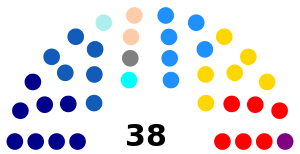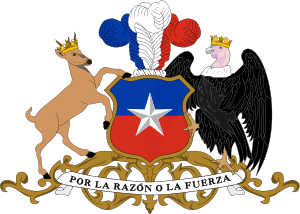Senate of Chile
| Senate of the Republic of Chile Senado de la República de Chile | |
|---|---|
| 54th National Congress | |
 Seal | |
| Type | |
| Type |
Upper House of the National Congress of Chile |
Term limits | None |
| Leadership | |
President | |
Vice-President | |
Mayority Leader | |
Minority Leader | |
| Structure | |
| Seats | 38 |
 | |
Political groups |
Out of pact:
|
| Elections | |
| Binomial System | |
Last election | November 17, 2013 |
Next election | 2017 |
| Meeting place | |
 | |
| Senate Chamber, National Congress Building, Valparaíso, Chile | |
| Website | |
| http://www.senado.cl | |
 |
| This article is part of a series on the politics and government of Chile |
|
Politics portal |
The Senate of the Republic of Chile is the upper house of Chile's bicameral National Congress, as established in the current Constitution of Chile.
Composition
According to the present Constitution of Chile, the Senate is composed of thirty-eight directly elected senators, chosen by universal popular suffrage vote in 19 senatorial circumscriptions. These serve eight-year terms, with half of them being replaced every fourth year. They must be eligible to vote, have completed secondary school, or its equivalent, and be at least 35 years old.
The Senate sessions at the new (1990) National Congress located in the port city of Valparaíso that replaced the old National Congress located in downtown Santiago, the nation's capital.
Abolition of the unelected
Amendments to the Constitution, approved by a joint session of Congress on August 16, 2005, eliminated non-directly elected senators from March 11, 2006, the day 20 newly elected senators were sworn in, leaving the total number of senators at 38, all directly elected. Previously, according to the Constitution of 1980, "designated" or "institutional" senators were appointed to the chamber. Two former heads of state, Eduardo Frei Ruiz-Tagle and Augusto Pinochet, were installed as senators for life. Pinochet later resigned from this position and Frei lost his seat in the 2005 reform. However, Frei remained in the Senate by winning an elective seat.
Historical evolution
The Senate of Chile was created in 1812 to support the formulations of policies of the Government Junta. Since then it has undergone several constitutional reorganizations that have altered the scope of its constitutional powers, its composition and the generation of its members.
First senate
Created by Article 7 of the Provisional Constitutional Manual of 1812. It was composed of seven titular members (one for each province) and three alternate members and was supposed to serve as a counterbalance to the executive power of the Government Junta. The senators were directly nominated by the provinces in agreement with the central government. It functioned from November, 1812 to January, 1814, when it was reorganized to better respond to the problems caused by the successive military defeats at the hands of the advancing Spanish Army.
Consultive senate
Created by Article 13 of the Provisional Government Manual of 1814. As its predecessor, it was composed of seven titular members (only) nominated by the provinces in lists of three from which they were selected by the Supreme Director. It functioned from March to July, 1814, when the Spanish Army captured Santiago, putting an end to the Patria Vieja government.
First conservative senate
Created by Title III of the Constitution of 1818. It was composed of five titular members and five alternate members selected directly by the Supreme Director. It was supposed to function only when the lower house was not in function or could not meet, and had the power to enact "provisory rules" that had the same effect as laws (hence the "conservative" moniker, because it "conserved" the power.) It functioned from October, 1818 to May, 1822.
Senators (2006-2010)
Senate composition from March 11, 2006 to March 11, 2010.
| Constituency | Region | Name | Party | Last elected |
|---|---|---|---|---|
| 1 | Arica and Parinacota Tarapacá |
Fulvio Rossi | PS | 2009 |
| Jaime Orpis Bouchon | UDI | 2009 | ||
| 2 | Antofagasta | Carlos Cantero Ojeda | Ind.[1] | 2005 |
| José Antonio Gómez Urrutia (Vice-President, March 11, 2010 – March 15, 2011; March 20, 2013 – present) |
PRSD | 2005 | ||
| 3 | Atacama | Isabel Allende | PS | 2009 |
| Baldo Prokurica Prokurica (Vice-President, March 12, 2008 – March 13, 2009) |
RN | 2009 | ||
| 4 | Coquimbo | Gonzalo Uriarte | UDI | 2005 |
| Jorge Pizarro Soto (President, March 11, 2010 – March 15, 2011; March 20, 2013 – present) |
PDC | 2005 | ||
| 5 | Valparaíso | Ignacio Walker | PDC | 2009 |
| Lily Pérez | RN | 2009 | ||
| 6 | Ricardo L. Weber | PPD | 2009 | |
| Francisco Chahuan | RN | 2009 | ||
| 7 | Santiago | Guido Girardi Lavín (President, March 15, 2011 – March 20, 2012) |
PPD | 2005 |
| Jovino Novoa Vásquez (President, March 13, 2009 – March 11, 2010) |
UDI | 2005 | ||
| 8 | Ena von Baer | UDI | 2005 | |
| Soledad Alvear Valenzuela | PDC | 2005 | ||
| 9 | O'Higgins | Alejandro García-Huidobro | UDI | 2005 |
| Juan Pablo Letelier Morel (Vice-President, March 15, 2011 – March 20, 2012) |
PS | 2005 | ||
| 10 | Maule | Ximena Rincón | PDC | 2009 |
| Juan Antonio Coloma Correa | UDI | 2009 | ||
| 11 | Andrés Zaldívar | PDC | 2009 | |
| Hernán Larraín Fernández | UDI | 2009 | ||
| 12 | Biobío | Alejandro Navarro Brain (Vice-President, March 20, 2012 – March 20, 2013) |
MAS[2] | 2005 |
| Hosain Sabag Castillo | PDC | 2005 | ||
| 13 | Mariano Ruiz-Esquide Jara | PDC | 2005 | |
| Víctor Pérez Varela | UDI | 2005 | ||
| 14 | Araucanía | Jaime Quintana | PPD | 2009 |
| Alberto Espina Otero | RN | 2009 | ||
| 15 | Eugenio Tuma | PPD | 2009 | |
| José García Ruminot | RN | 2009 | ||
| 16 | Los Ríos (plus District 55) |
Carlos Larraín Peña | RN | 2005 |
| Eduardo Frei Ruiz-Tagle (President, March 11, 2006 – March 12, 2008) |
PDC | 2005 | ||
| 17 | Los Lagos (minus District 55) |
Camilo Escalona Medina (President, March 20, 2012 – March 20, 2013) |
PS | 2005 |
| Carlos Kuschel Silva | RN | 2005 | ||
| 18 | Aisén | Patricio Walker | PDC | 2009 |
| Antonio Horvath Kiss | RN | 2001 | ||
| 19 | Magallanes | Carlos Bianchi Chelech (Vice-President, March 13, 2009 – March 11, 2010) |
Ind. | 2005 |
| Pedro Muñoz Aburto | PS | 2005 |
See also
- President of the Senate of Chile
- National Congress of Chile
- Chamber of Deputies of Chile
- Politics of Chile
- List of legislatures by country
Notes
- ↑ Elected as RN member, but quit the party in November 2007, after conflicts with the party leadership.
- ↑ Elected as a PS member, but quit the party in November 2008 to form his own political party, Broad Social Movement (MAS). He has pledged he will remain loyal to President Michelle Bachelet.
External links
| ||||||||||||||||||||||